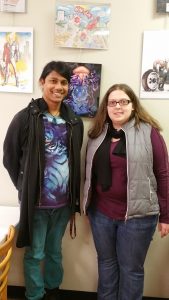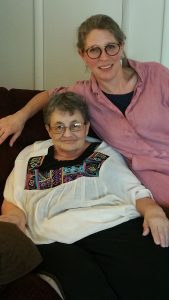
Being an Advocate
When we talk to people about becoming an advocate, many questions arise. Some people wonder about what advocates do, others ask about how much time is involved, and many wonder if special training or qualifications are needed. Below you will find the answers to all of these questions.
Citizen Advocacy presumes that “regular” people are more than qualified to care about and go to bat for a fellow human being! Advocates are all ages and come from all walks of life, each bringing their own very individual range of life experiences and skills. Many are active people, some working full time. Advocates consciously choose to weave this voluntary role into their busy lives. No special qualifications or experience are necessary. But there are likely to be some commonly held beliefs among those who say “yes” to becoming an advocate.
Hear about Mike and Gerry’s Story!
A citizen advocate is someone who:

- Believes that every person’s life has inherent value and worth.
- Knows and believes that all people deserve to be treated with dignity and respect.
- Believes that people with disabilities have the same needs and interests as every other member of society.
- Understands that people with disabilities have generally been segregated, isolated, and very often abused, neglected, or at least disadvantaged.
- Thinks that all people need something meaningful to do with their lives.
- Is willing to make a long-term commitment to another person.
- Chooses to stand with and for another person who might be especially vulnerable.
- Can imagine what is possible for another person, rather than start with perceived limitations.
Why is Citizen Advocacy and the role of the advocate so important?
- Let’s face it, we live in a world that is oppressive to people who don’t fit our image of health, wealth and brains. Many people prefer to think of the world as a kind, welcoming place, and if only we could fix things, it would be a great world for everybody. Well, there’s been centuries of “fixing up” and we have just as much oppression, poverty, prejudice and hatred in the world as we ever had.
- The question, then, is not a matter of fixing things up, but is a moral choice of where each person stands in the face of dynamics that oppress and even destroy vulnerable people. Fortunately, there are people who will stand in the face of oppression, and will do the right thing in standing by, for, and with oppressed people.
- Citizen Advocacy provides very real opportunities for individuals to act upon that moral choice. “Moral” simply means having the ability to tell right from wrong. It is wrong to treat anyone as less than oneself. It is right to regard all people as of equal value and worth, and to act upon that belief by defending the life of a vulnerable person.
What does an advocate do?
- With coordinator support, the advocates take on many different roles. Advocates have used their own networks to help their partner find a place to live, a job, medical and financial representation, transportation to jobs and appointments, and community involvement. Some advocates have helped with household tasks such as shopping, cleaning and balancing checkbooks. Advocates have intervened successfully with hospitals, landlords, employers, teachers, and social workers on behalf of their partners.
- Often advocates build strong personal friendships with their partners, and introduce them to social and family life, sometimes for the first time in their partner’s life. They develop mutual trust, respect and caring.
How much time does being an advocate take?
- This varies completely in each relationship and is determined by the advocate and his/her partner. Advocates are asked to decide how much time they feel will meet the interests of their partners.
How are advocates matched with their partners?
- Coordinators start by getting to know the person with the disability. We learn what we can about their history and some of the issues they are facing. We think about a role a citizen advocate might play in this person’s life. We think about the qualities that the citizen advocate should have. Then we go to people we trust and ask, “Who do you know that…” We then talk with the potential advocate, learn as much as we can about them and then if what we have learned suggests a good match, we introduce the two people. We meet together several times and then both people decide if they would like to be partnered in a citizen advocacy relationship. We help with first steps and then we support the advocate as needed.
How long does it last?
- Unless specifically asked to do something short term, coordinators ask advocates to make a long term, generally lifelong, commitment.
Why have I not heard of you before?
- We do not advertise or seek publicity because the work we do is personal and it is done one-to-one. We learn a lot about people’s lives and their histories and their stories. We want to respect the stories of people’s lives. They may choose to let us share their stories. Board members, citizen advocates, and friends of the office introduce us to people that they know and trust and invite those people to learn more about the organization and perhaps to become involved as citizen advocates in the future.
(Content adapted from Citizen Advocacy of Chester County)